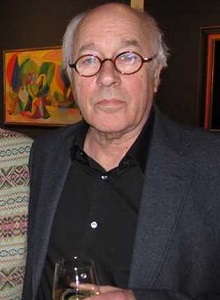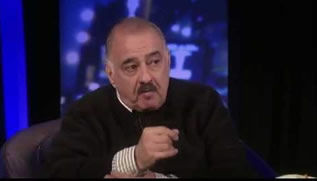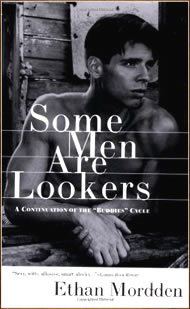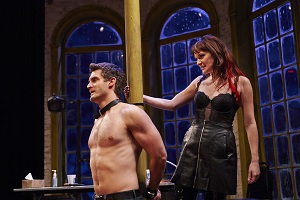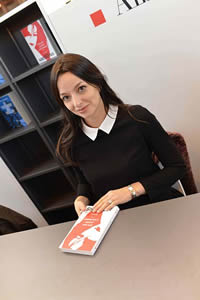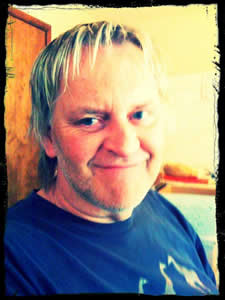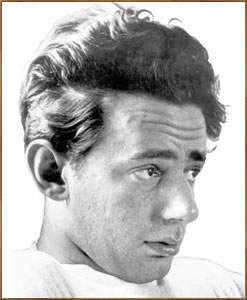De Nederlandse dichter en schrijver Rudolf Geel werd geboren in Amsterdam op 27 januari 1941. Zie ook alle tags voor Rudolf Geel op dit blog.
Uit: De voeten van Petrus
“5
‘Hoe komt “ons eigen nationale beest” om met Godfried Bomans te spreken, hier op deze Romeinse heuvel?’ vraagt de schrijver van mijn reisgids. Een noot vermeldt: ‘nadere details over dit curieuze en tragikomische geval geeft Godfried Bomans, Wandelingen door Rome.’
‘Ons eigen nationale beest’ is natuurlijk een leeuw. Ik bedoel: deze informatie verschaft de gids al eerder. Deze leeuw bevindt zich in het park van de Villa Borghese. Een speciaal bezoek ter ere van dit beeld is niet aan te bevelen. Zelfs niet aan de hand van onze eigen nationale Bomans. De laatste tijd zijn er verschillende aspecten van deze curieuze en tragikomische man behandeld. Hier iets over zijn gebruik van taal.
Als alle volkeren hun werkelijke ‘nationale beest’ kregen toebedeeld, dan zou de Nederlandse leeuw veranderen in een vooral herkauwende koe, de Duitse adelaar kreeg de gedaante van een zwijn, de Franse maagd werd een zuur oud wijf met slagtanden en Jan Stier een biscuitblik.
De Nederlandse leeuw is dan ook een symbool. Ons eigen Nederlandse symbool. Is hij dan ook een beest? Nee. De leeuw, koning Nobel, is de heerser over het dierenrijk. Het hoofdbeest dus, binnen het grappige idioom van Bomans. En daarom gaat het mij. ‘Ons eigen nationale beest’ is een grap, het is zogenaamd lollig bedoeld. Het is leuk. Maar in werkelijkheid is het helemaal niet leuk om van een leeuw een beest te maken. Dat is uitsluitend lollig, dat moet de Moerdijk over, dat is de feestneus van Oubol Roi. Met ‘beest’ ironiseer je de leeuw namelijk niet (de leeuw staat boven deze spot), maar evenmin met ‘ons nationale beest’ het feit dat wij uitgesproken een leeuw als symbool hebben.
Opgave: pas dezelfde bewijsvoeringen toe op: ‘Bomans, de pauselijke chimpansee’.”
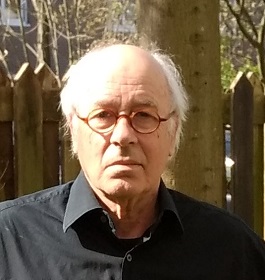
Rudolf Geel (Amsterdam, 27 januari 1941)
De Nederlandse schrijfster en journaliste Jannetje Koelewijn werd geboren in Amsterdam op 27 januari 1959. Zie ook alle tags voor Jannetje Koelewijn op dit blog.
Uit: Heilbrons hel
“Lucas strekte zijn hals om het beter te kunnen zien. Bladerdeeg met iets erin. Rookworst. Ja, het was een halve rookworst in een goudglanzend omhulsel van gevlochten bladerdeeg, met mosterd, en mayonaise. Gadverdamme, dat zou hij dus nooit meer doen. Geen gefrituurde etenswaren meer als hij getankt had. De diëtiste had hem voorgerekend dat het op dagbasis algauw achthonderd calorieën scheelde, zo niet duizend of meer. `Het equivalent van een flinke warme maaltijd, meneer Pauw.’ `Zoveel?’ `Zoveel. En dat neemt u dus als hartig tussendoortje.’ In de auto had hij nog een appel liggen. Eenentwintig over vijf. Waarom schoten ze niet een beetje op bij de kassa? God, kijk nou, die vent. Hij kauwde nog op de laatste hap van zijn rookworst en het meisje achter de counter reikte hem al een grote puntzak met friet aan. Leuk kind trouwens. Aardig gezichtje. Vond die vent ook, want hij lachte naar haar. Vrachtwagenchauffeur, wedden? Dat vettige haar, die laag op de heupen hangende spijkerbroek met de verkeerde schoenen eronder. Nee, dan zijn schoenen. Zwarte brogues. Leren zolen. Smal en elegant. Ze zou hem niet op een slechte smaak betrappen. Ze zou meteen in de gaten hebben dat hij zich op een onnadrukkelijke manier uitstekend wist te kleden. Zijn maag knorde. Hij was aan de beurt om te betalen en toetste zijn pincode in. Zouden ze uit eten gaan? Wat als ze het zo gezellig zouden hebben dat ze de tijd vergaten en pas om een uur of acht, halfnegen op zoek zouden gaan naar een restaurant? Het kon wel halftien worden voordat ze het voorgerecht kregen. Een of ander liflafje. Friet was minder erg dan een kroket. In feite was friet gewoon aardappel met wat plantaardige olie. Geen verzadigde vetten, geen rood vlees. Hij zou aan dat meisje vragen of ze er niet te veel zout op wilde doen. En geen mayonaise. Drie minuten voor halfzes, hij moest wel gaan opschieten. `Hoe lang moet ik wachten als ik een portie friet bestel?’ `Het is al klaar, meneer. Een grote of een kleine?’ `Een eh… grote. Niet te veel zout.’ `Zit er al op, meneer. Ik kan het er niet meer af halen. Mayonaise? Pindasaus? Uitjes?’
Ui mocht. Ui was groente. Ui zonder saus zou niet blijven plakken. De snippers zouden van het frietje af rollen op het moment dat hij het in zijn mond wilde steken. Op zijn das. Gegarandeerd. `Meneer?’ `Mayonaise en uitjes, graag. Niet te veel.’ Heet, heet, heet. God, wat was dit lekker. De friet vroeger als ze met Koninginnedag naar de kermis op de Dam gingen. Hij zag zichzelf zitten, met zijn broers en zijn zusje, op de trappen van het Monument. Pa deelde de bakjes uit, kleine porties, zonder mayonaise, want dat gaf maar geklieder.”
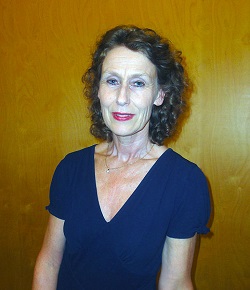
Jannetje Koelewijn (Amsterdam, 27 januari 1959)
De Italiaanse schrijver Paolo Cognetti werd geboren in Milaan op 27 januari 1978. Zie ook alle tags voor Paolo Cognetti op dit blog.
Uit: De acht bergen (Vertaald door Yond Boekeen Patty Krone)
“Op die plekken waren ze verliefd geworden, dat begreep ook ik na een tijdje: een priester had hen er als tieners mee naartoe genomen, en dezelfde priester had hen op een herfstochtend getrouwd, aan de voet van de Tre Cime di Lavarcdo, voor het kerkje dat daar staat. Dat berghuwelijk was de stichtingsmythe van ons gezin. Tegengewerkt door de ouden van mijn moeder, om redenen die mij onbekend waren, voltrokken in aanwezigheid van maar een paar vrienden, met windjacks als trouwkleding en voor hun eerste nacht als man en vrouw een bed in de Auronzohut. De sneeuw schitterde al op de richels van de Cima Grande. Het was een zaterdag in oktober, in 1972, het einde van hun alpinistenseizoen voor dat jaar en vele jaren daarna: de dag daarop laadden ze hun leren bergschoenen, hun Imidcerbockers, haar zwangerschap en zijn arbeidscontract in de auto en reden naar Milaan.
Kalmte was geen deugd die mijn vader hoog in het vaandel had staan, maar in de stad zou hij daar meer aan hebben gehad dan aan uithoudingsvermogen. Uitzicht had je in Milaan wel: in de jaren zeventig woonden we in een flat die uitkeek op een brede, drukke weg — ze zeiden dat onder het asfalt een rivier stroomde, de Olona. De straat kwam op regendagen blank te staan, en dan stelde ik me voor hoe de rivier daarbeneden in het donker bulderde en opzwol totdat hij uit de putdeksels golfde. Maar in die andere rivier, die werd gevormd door auto’s, bestelbusjes, brommers, vrachtwagens, bussen en ziekenwagen; was het voortdurend hoogwater. We woonden op de zevende verdieping: het kabaal werd versterkt door de twee rijen identieke flats aan weerszijden van de straat Op sommige nachten werd het mijn vader te veel, dan stond hij op en gooide het raam wijd open, alsof hij de stad wilde uitschelden, haar het zwijgen wilde opleggen of gloeiende pek over haar wilde uitstorten; hij bleef een tijdje naar beneden staan kijken, trok vervolgens zijn jas aan en ging een eind lopen. Vanuit ons raam zagen we een groot stuk lucht Eenvormig wit, ongeacht de seizoenen, slechts doorsneden door een enkele vogel. Tegen beter weten in kweekte mijn moeder bloemen op een door de rook zwart uitgeslagen en door eindeloze regenbuien beschimmeld balkonnetje. Daar verzorgde ze haar plantjes en vertelde me intussen over de wijngaarden in augustus op het platteland waar ze was opgegroeid, of over de tabaksbladeren die in de drogerijen aan lange stokken hingen, of over de asperges die, om ze wit te houden, moesten wonden geoogst voordat ze boven de aarde uitkwamen, en dat je dus een speciaal talent nodig had om ze te zien terwijl ze nog onder de grond zaten.”
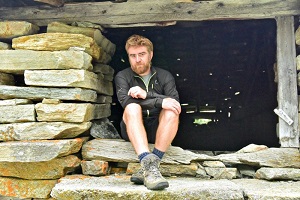
Paolo Cognetti (Milaan, 27 januari 1978)
De Amerikaanse schrijver Ethan Mordden werd geboren op 27 januari 1947 in Pennsylvania. Zie ook alle tags voor Ethan Mordden op dit blog.
Uit: Buddies
“More quotidian possibilities include eating corn on the cob with a fork (the kernels come off in sedate little rows, which for some reason exasperates all the males at the table) and developing ersatz but noisy phobias about bridges, escalators, and religious activities of any kind. Rule Three: Never lie. Childlike honesty throws Them completely off. Moreover, as parents are virtually made of lies (e.g., “Don’t be afraid of bullies; stand up to Them and they’ll run away,” “If you stop crying and wait till we get home, I’ll make you an apple pancake,” “We have no favorites; we love you all equally”), your speaking truth undermines Their ethical position. Furthermore, lying is a sophisticated art generally beyond even the most gifted youngster. Almost any effort is doomed. And, remember: your failure is Their success. It is essential to avoid any error that will invigorate Their sense of power, and Their joy in that power. The sight of a small boy pathetically trying to worm his way out of a spanking enchants Them even more than administering the spanking itself. If you must be spanked, de-spoil it of all savor. Be cold and adult about it, like George Will at the dentist. Or try to look embarrassed for Them, as if you had spotted Them committing some atrocious peccadillo in a secret spot. Advanced students may want to Do the Manly Thing and insist on tak-ing it bare-bottom. With all but the most diehard parents, this will force Them to retreat, perhaps even apologize. Rule Four: Abjure reason and justice; only strength counts. As the tenant of a house owned by grown-ups, you are not the inhabitant of a moral universe: you live in a world populated exclusively by winners and losers. Show me a good loser, and I’ll show you a loser. Rule Five: Choose the major battles very carefully. Go to the mat over bedtime, food, and presents, major issues that will color your existence for nearly two decades. Don’t overextend yourself fighting over the small things—and of course it’s useful every so often to give in and let Them think They’re in charge.”

Ethan Mordden (Pennsylvania, 27 januari 1947)
De Stonewall Inn, een homobar op Christopher Street in Greenwich Village, Manhattan. Een politie-inval in 1969 leidde hier tot de Stonewall-rellen, een van de belangrijkste gebeurtenissen in de geschiedenis van LGBT-rechten
De Engelse dichter en schrijver Lewis Carroll werd op 27 januari 1832 in Daresbury geboren. Zie ook alle tags voor Lewis Caroll op dit blog.
Uit: Alice in Wonderland
“We, indeed!” cried the Mouse, who was trembling down to the end of its tail. “As if I would talk on such a subject! Our family always hated cats: nasty, low, vulgar things! Don’t let me hear the name again!”
“I won’t indeed!” said Alice, in a great hurry to change the subject of conversation. “Are you—are you fond—of—of dogs?” The Mouse did not answer, so Alice went on eagerly: “There is such a nice little dog, near our house, I should like to show you! A little bright-eyed terrier, you know, with oh, such long curly brown hair! And it’ll fetch things when you throw them, and it’ll sit up and beg for its dinner, and all sorts of things—I can’t remember half of them—and it belongs to a farmer, you know, and he says it’s so useful, it’s worth a hundred pounds! He says it kills all the rats, and—oh dear!” cried Alice in a sorrowful tone, “I’m afraid I’ve offended it again!” For the Mouse was swimming away from her as hard as it could go, and making quite a commotion in the pool as it went.
So she called softly after it, “Mouse dear! Do come back again, and we won’t talk about cats, or dogs either, if you don’t like them!” When the Mouse heard this, it turned round and swam slowly back to her: its face was quite pale (with passion, Alice thought), and it said, in a low trembling voice, “Let us get to the shore, and then I’ll tell you my history, and you’ll understand why it is I hate cats and dogs.”
It was high time to go, for the pool was getting quite crowded with the birds and animals that had fallen into it: there was a Duck and a Dodo, a Lory and an Eaglet, and several other curious creatures.
Alice led the way, and the whole party swam to the shore.
They were, indeed, a queer-looking party that assembled on the bank—the birds with draggled feathers, the animals with their fur clinging close to them, and all dripping wet, cross, and uncomfortable.
The first question of course was, how to get dry again: they had a consultation about this, and after a few minutes it seemed quite natural to Alice to find herself talking familiarly with them, as if she had known them all her life. Indeed, she had quite a long argument with the Lory, who at last turned sulky, and would only say, “I’m older than you, and must know better.”
And this Alice would not allow, without knowing how old it was, and, as the Lory positively refused to tell its age, there was no more to be said.”
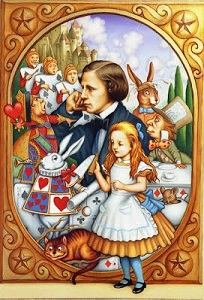
Lewis Carroll (27 januari 1832 – 14 januari 1898)
Lewis Carroll temidden van zijn creaties uit Alice in Wonderland
De Nederlandse dichter, schrijver, vertaler, zanger en liedjesschrijver Arie van der Krogt werd geboren in Zoeterwoude op 27 januari 1952. Zie ook alle tags voor Arie van der Krogt op dit blog.
Veertig (40)
Ik fietste in de bergen op de Tourmalet
Ik had m’n versnelling in z’n dertigste gezet
Toen kwam d’r zo’n klein jochie heel snel voorbij geracet
Die reed op tandje veertig want veertig is het meest
Veertig is het mooiste, veertig is het meest
Want als je veertig bent dan is er lol, dan is er feest
Ik was eens op vakantie met een mannetje of tien
Toch had ik al die mensen na drie dagen wel gezien
Ik zeg tegen mezelf en ik zeg ook tegen Trees
Volgend jaar gaan we met veertig want veertig is het meest
Ik kreeg pas in de brievenbus een boek van ‘Boek en Plaat’
Dat over variaties bij het vrijen gaat
Ik heb die variaties natuurlijk uitgetest
Maar geef mij maar standje veertig, dat ligt me toch het best
Ik moest pas naar het ziekenhuis, naar Medisch Centrum West
Maar ik was veel te vroeg, ik zat in aflevering zes
Ik kwam bij zuster Reinie, die zuster die zo flirt
En in aflevering veertig, toen was ik aan de beurt
Ik liep in Palestina met twaalf van die gasten
Toen vroeg ik aan die ene hoeveel dagen moet je vasten
Hij zet z’n aureool op en hij zegt: “Wees niet bevreesd”
Veertig is het mooiste, veertig is het meest
Ik ging een keertje tennissen, dat was met ’n vriendin
Ik dacht ik ben een mannetje, dus ’t is zeker dat ik win
Maar na een drietal ballen toen was ik al bek-af
Ik zei het staat drie-nul voor jou, maar zij zei “Forty Love”
Veertig is het mooiste, veertig is het meest
Want als je veertig bent dan is er lol, dan is er feest
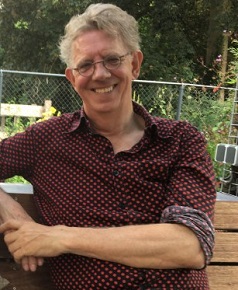
Arie van der Krogt (Zoeterwoude, 27 januari 1952)
De Amerikaanse dichter Harvey Shapiro werd op 27 januari 1924 in Chicago geboren in een joodse familie uit Kiev. Zie ook alle tags voor Harvey Shapiro op dit blog.
Provincetown, Mass.
The glazed day crumbles to its fall
Upon the tiny rout of fishing
Boats. Culls convey it down,
Lengthening their cries that soon
Will rake the evening air; while some,
Silhouetted on a strand
In a jumbled line of target ducks,
Watch as ebb tide drains the bay.
From a rotted log upon
The shore, like the other beached
Mutations, shell and weed, I wait
For Highland Light to cast its eye.
July unhives its heaven in
A swarm of stars above my head.
And at my feet, flat to the water
That it rides, the lighthouse beam,
A broken spar, breaks its pulse.
-What have I learned of word or liner
Ticks on, ticks off; ticks on, ticks off.
The bay, that was a clotted eye,
Is turned to water by the dark.
Only my summer breaks upon
The sea, the gulls, the narrow land.
Beyond The Demonic Element
I cast out Beyond the demonic element
And the fear of death
(And the fear of death)
Into that bright water
Beyond this water
Where leviathan swims.
Communication is instant
When it comes—close
As my hand, the words on my tongue,
Though the crying in my ear Is my own death crying.
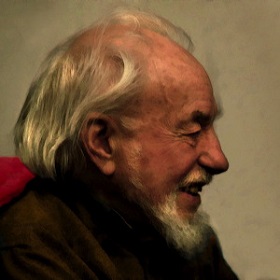
Harvey Shapiro (27 januari 1924 – 7 januari 2013)
Zie voor nog meer schrijvers van de 27e januari ook mijn blog van 27 januari 2018 deel 2 en eveneens deel 3.

